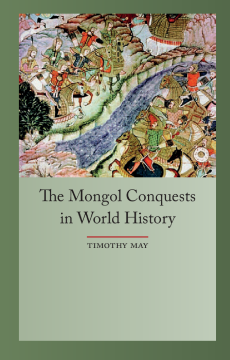
Additional Information
Book Details
Abstract
The Mongol Empire can be seen as marking the beginning of the modern age, and of globalization as well. While communications between the extremes of Eurasia existed prior to the Mongols, they were infrequent and often through intermediaries. As this new book by Timothy May shows, the rise of the Mongol Empire changed everything—through their conquests the Mongols swept away dozens of empires and kingdoms and replaced them with the largest contiguous empire in history.
While the Mongols were an extremely destructive force in the premodern world, the Mongol Empire had stabilizing effects on the social, cultural and economic life of the inhabitants of the vast territory, allowing merchants and missionaries to transverse Eurasia. The Mongol Conquests in World History examines the many ways in which the conquests were a catalyst for change, including changes and advancements in warfare, food, culture, and scientific knowledge. Even as Mongol power declined, the memory of the Empire fired the collective imagination of the region into far-reaching endeavors, such as the desire for luxury goods and spices that launched Columbus’s voyage and the innovations in art that were manifested in the masterpieces of the Renaissance.
This fascinating book offers comprehensive coverage of the entire empire, rather than a more regional approach, and provides an extensive survey of the legacy of the Mongol Empire.
“As the subject of world history becomes more and more popular, May’s work is an admirable contribution to this field and a necessary guide for teaching and research today.”
— H-Net Reviews
“This vividly written book that manifests the author’s fascination with its subject will become a useful textbook for world history courses and for classes on the Mongol empire.”
— Journal of Asian Studies
“General readers will have a lot to mull over, and specialists will be stunned at the range of material May fearlessly took upon himself. . . . He also leaves no technical term unexplained; no group, person, or place unidentified; no theme ignored. In addition he includes the picturesque, gruesome, or even funny details that undergraduates will remember and discuss at parties. His scope, ambition, and many of his results deserve to be commended.”
— Journal of World History
“Although globalisation is not a phenomenon that is readily associated with the Middle Ages, May makes a strong case for the emergence of a quasi-global system from the early-thirteenth to the mid-fourteenth century. . . . Written with both clarity and zest and resting upon a wide range of recent scholarship, this book will be widely welcomed as a contribution to the study of world history.”
— History Today
“There is much food for thought here. . . . This is a wonderful book for teaching and for new ideas; not the least of its virtues is May’s dry humour, which pops up when least expected. He brings us to the forefront of recent research and conjecture. . . . this is the book of choice for a course that explores the world that the Mongols helped to make.”
— Journal of Global History
“This volume’s primary purpose is to show how the Mongols were a catalyst for change in the first stage of true globalization in human history. Rather than the usual focus on only the negative aspects of the Mongols conquests, May stresses their positive role and contribution to Eurasian history, analyzing the Mongols’ influence and legacy. . . . Both general readers and specialists can benefit from this well-written history. Recommended.”
— Choice
“In this new and impressive contribution to the fields of Central Asian and world history, May advocates locating the foundations of the modern world with the Mongol conquests. May is similarly concerned with identifying the lasting legacies of the Mongol Empire, but readers will find this volume to be significantly less biased and more constructive than other recent revisionist efforts . . . a very fine study.”
— Bulletin of the School of Oriental and African Studies
Timothy May is associate professor in and head of the Department of Central Eurasian and Middle Eastern History at North Georgia College and State University. He is also the author of The Mongol Art of War: Chinggis Khan and the Mongol Military System and Culture and Customs of Mongolia.
